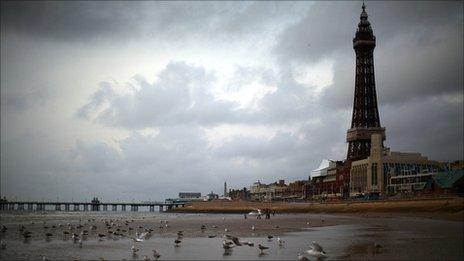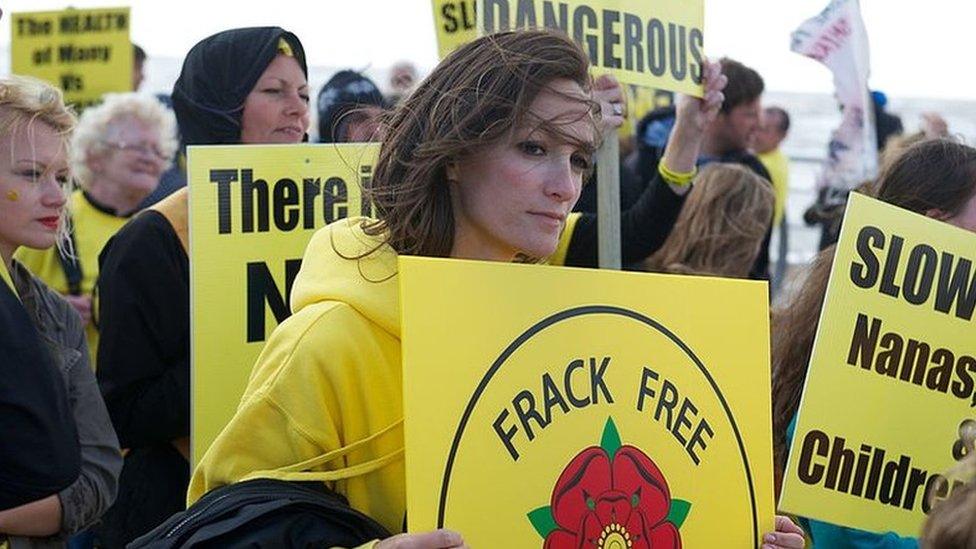Fracking tests near Blackpool 'likely cause' of tremors
- Published
Cuadrilla's Mark Miller: "There are procedures we can put in place to practise earthquake prevention"
It is "highly probable" that shale gas test drilling triggered earth tremors in Lancashire, a study has found.
But the report, commissioned by energy firm Cuadrilla, also said the quakes were due to an "unusual combination of geology at the well site".
It said conditions which caused the minor earthquakes were "unlikely to occur again".
Protesters opposed to fracking, a gas extraction method, said the report "did not inspire confidence".
Six protesters from campaign group Frack Off climbed a drilling rig at one of Cuadrilla's test drilling sites in Hesketh Bank, near Southport, ahead of the report.
They oppose the controversial extraction method which pumps water and chemicals underground at high pressure to shatter rock formations and release gas, claiming it can be unsafe.
Safety concerns
A spokeswoman for Lancashire Police said the protest came to an end at about 16:00 GMT. Three people were arrested on suspicion of aggravated trespass. Three others were reported for summons, on the same allegation.
Cuadrilla suspended its shale gas test drilling in June, over fears of links to the earthquakes.
One tremor of magnitude 2.3 hit the Fylde coast on 1 April, followed by a second of magnitude 1.4 on 27 May.
A study by The British Geological Survey placed the epicentre for each quake about 500m away from the Preese Hall-1 well, at Weeton, near Blackpool.
The Geo-mechanical Study Of Bowland Shale Seismicity , externalreport, carried out by independent experts, said the combination of geological factors that caused the quakes was rare, and would be unlikely to occur together again at future well sites.
It said: "If these factors were to combine again in the future local geology limits seismic events to around magnitude 3 on the Richter scale as a worst-case scenario."
However, it said that "even the maximum seismic event is not expected to present a risk".
Mark Miller, chief executive officer of Cuadrilla Resources, said: "We unequivocally accept the findings of the independent report and we are pleased that there is no threat to people or property in the local area from our operations.
"We are ready to put in place the early detection system that has been proposed in the report so that we can provide additional confidence and security to the local community.
"Cuadrilla is working with the local and national authorities to implement the report's recommendations so we may resume our operations."
A spokesman for Frack Off said: "This report does not inspire confidence, they should have done their research before drilling began."
He added: "Can we believe anything else the industry says when it talks about the safety of fracking?"
Protesters have called for an end to fracking. There have been concerns that potentially carcinogenic chemicals could escape during the process and find their way into drinking water sources.
'Hopelessly naive'
"The contamination of irrigation water means that everyone's food supplies could potentially be affected," the Frack Off spokesman added.
Friends of the Earth's senior climate campaigner Tony Bosworth said: "This report shows fracking for shale gas caused earth tremors in Lancashire - experience in the US shows it could also pollute air and water supplies.
"Extracting shale gas would suck vital funding away from clean and safe energy alternatives that could create thousands more UK jobs.
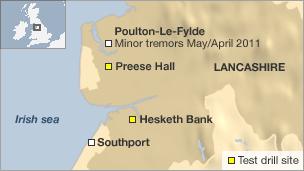
"An early seismic detection system won't be enough to make local people feel safe - there should be no more fracking in Britain until the health and environmental impacts are fully understood."
Doug Parr, chief scientist at Greenpeace, added: "Anyone who believes shale gas is the solution to our energy needs is being hopelessly naive.
"There are significant unknowns about the local and global impacts of fracking, illustrated by the conclusion by seismologists that recent fracking in the North West was responsible for a minor earthquake."
He said fracking was a "distraction from the real challenges" and that "real energy solutions" would be found in using renewable sources.
Nick Molho, head of energy policy at World Wildlife Fund UK, reiterated a call for a moratorium on fracking in the UK.
"These findings are worrying, and are likely to add to the very real concerns that people have about fracking and shale gas," he said.
The industry denies that shale gas is unsafe and a government committee has recommended that fracking should be allowed to go ahead.
The Department of Energy and Climate Change (DECC) said: "The implications of this report will be reviewed very carefully - in consultation with the British Geological Survey, independent experts, and the other key regulators, HSE and the Environment Agency - before any decision on the resumption of these hydraulic fracture operations is made."
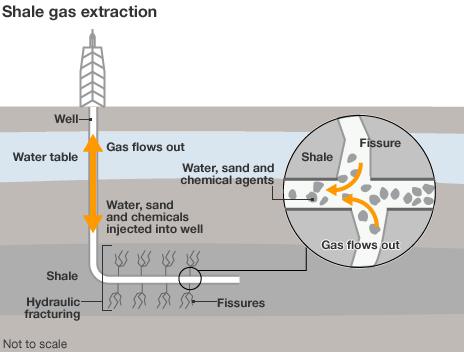
- Published6 August 2011
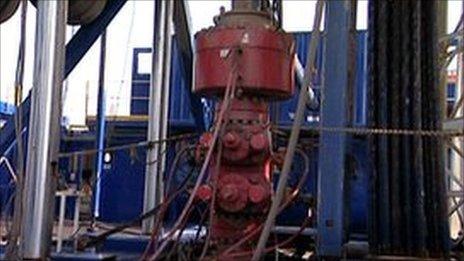
- Published8 June 2011

- Published28 May 2011
